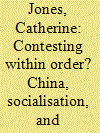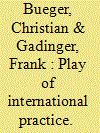| Srl | Item |
| 1 |
ID:
174073


|
|
|
|
|
| Summary/Abstract |
Debates on China’s engagement with international institutions centre on a (false) dichotomy that China is either a status-quo or revisionist power. Both sides of this debate have ample empirical evidence to support their arguments and they tend towards conclusions that China’s behaviour and preferences lie in the space in between these two positions. It is important to consider how China presents a contest to international order from with international institutions.
|
|
|
|
|
|
|
|
|
|
|
|
|
|
|
|
| 2 |
ID:
141845


|
|
|
|
|
| Summary/Abstract |
The core claims of the practice turn in International Relations (IR) remain ambiguous. What promises does international practice theory hold for the field? How does the kind of theorizing it produces differ from existing perspectives? What kind of research agenda does it produce? This article addresses these questions. Drawing on the work of Andreas Reckwitz, we show that practice approaches entail a distinctive view on the drivers of social relations. Practice theories argue against individualistic-interest and norm-based actor models. They situate knowledge in practice rather than “mental frames” or “discourse.” Practice approaches focus on how groups perform their practical activities in world politics to renew and reproduce social order. They therefore overcome familiar dualisms—agents and structures, subjects and objects, and ideational and material—that plague IR theory. Practice theories are a heterogeneous family, but, as we argue, share a range of core commitments. Realizing the promise of the practice turn requires considering the full spectrum of its approaches. However, the field primarily draws on trajectories in international practice theory that emphasize reproduction and hierarchies. It should pay greater attention to practice approaches rooted in pragmatism and that emphasize contingency and change. We conclude with an outline of core challenges that the future agenda of international practice theory must tackle.
|
|
|
|
|
|
|
|
|
|
|
|
|
|
|
|
| 3 |
ID:
144060


|
|
|
|
|
| Summary/Abstract |
Scholars from the recent ‘practice turn’ in International Relations have urged us to rethink the international realm in terms of practices. The principal exponents of the turn, Emanuel Adler and Vincent Pouliot, have refurbished Pierre Bourdieu’s theory of practice to produce their own account of international practices. In a review of the practice turn, Chris Brown has argued that Bourdieu’s notion of practice shares basic affinities with Aristotle’s concept of praxis. While practice turn scholars may not adhere to a rigid canon of thought, they seem to share an Aristotelian conception of praxis. This reading of the turn to practice, though plausible, captures one part of the story. The central thesis of the present article is that instead of one there are two, distinctive conceptions of practice – Aristotelian and Wittgensteinian – and therefore two distinctive ways in which the character of international practices might be understood. More concretely, the aim is to show that the conception of international practices, rooted in Wittgenstein’s view of practices as language-games, can be particularly illuminating to all those who seek to understand international relations.
|
|
|
|
|
|
|
|
|
|
|
|
|
|
|
|